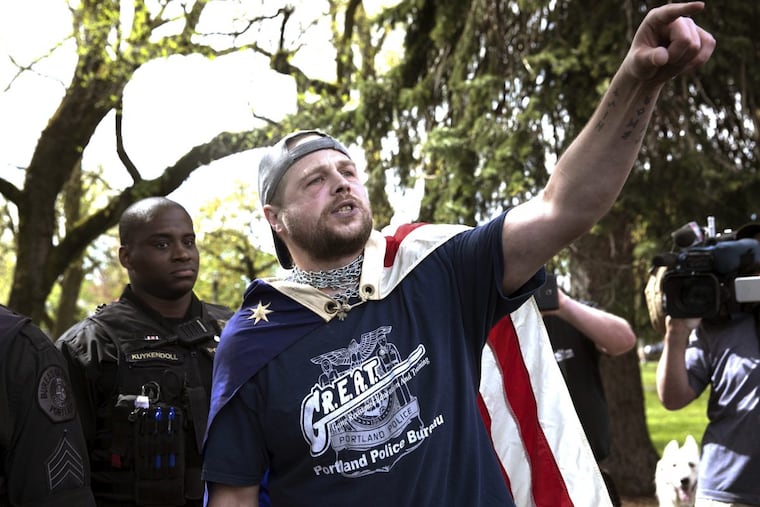Who radicalized white supremacist arrested in Portland attack?
The question of radicalization always comes up in discussions about Muslim terrorists. Why not in an attack by a white man?

Who radicalized him?
That question has been conspicuously absent from the discussion of the tragic stabbing deaths of two Good Samaritans who tried to stop 35-year-old Jeremy Joseph Christian — an avowed white supremacist — from harassing two teens of color on a Portland, Ore., train on Friday.
The stabbing, which occurred after Christian hurled ethnic and religious epithets at young women who appeared to be Muslim, deftly illustrated two facts. First, not every white person is a racist, as evidenced by the brave actions of Rick John Best, 53, and Taliesin Myrddin Namkai-Meche, 23, two white men who lost their lives while trying to stand up for young women of color.
The second more troubling fact is this. White supremacists such as Christian who engage in terroristic acts don't face the same question posed when the perpetrator is a religious minority or a person of color.
Who radicalized him?
If we asked that question when it comes to white supremacists, we would have to point to the leadership of our country, which seems content to protect religious freedom as long as that religion is Christianity. We inevitably would have to point to the long record of Islamophobic statements both written and spoken by Donald Trump, now and before he became president of the United States.
Trump — despite a Twitter statement condemning the stabbings and praising the Good Samaritans for standing up to hate — has spent years spreading anti-Muslim rhetoric. Many activists argue that Trump's words have emboldened white supremacists to engage in acts of violence against racial, ethnic and religious minorities. I agree.
The numbers say that Muslims, in particular, have seen an uptick in incidents targeting them, according to a report by the Council on American-Islamic Relations. In 2016, during the presidential campaign, anti-Muslim incidents increased by 57 percent, the report says.
While all of this can't be attributed to Trump, the man who now occupies the Oval Office has played a significant role in exacerbating the hatred and bigotry that already existed. And he was doing so long before he became president.
As an ordinary citizen, Trump for years engaged in a campaign spreading the false claim that Barack Obama was a Muslim born in Kenya. During his campaign for the presidency, Trump falsely claimed that a group of Muslims in New Jersey danced in celebration as the World Trade Center fell in the Sept. 11 terror attacks. He appeared on CNN and quoted a widely debunked poll from an anti-Islam group that claimed a quarter of Muslims in the U.S. believed violence against Americans should be part of a global holy war.
But Trump didn't stop with false statements and fake research. He has also issued a stream of statements that promoted violence against Muslims, and he did so when Americans were particularly vulnerable to the language of hate.
After a horrific attack in which a Muslim husband and wife — Syed Rizwan Farook and Tashfeen Malik — killed 14 people in San Bernardino, Calif., during a Christmas party at Farook's place of employment, Trump called Fox News and said, "The other thing with the terrorists is you have to take out their families, when you get these terrorists, you have to take out their families."
Never mind that killing the families of suspected terrorists is against international law. Trump, in his own words, believes Islam itself is the problem. That's why, in December 2015, he called for banning Muslims from the country.
"Donald J. Trump is calling for a total and complete shutdown of Muslims entering the United States until our country's representatives can figure out what is going on," Trump said at a campaign rally in South Carolina.
After he won the presidency, Trump tried twice to make good on that Muslim ban by targeting several Muslim-majority countries. Each time, the courts stopped him from implementing his unconstitutional ban.
Unfortunately, no court in the land can stop individual bigots who have been radicalized by Trump's anti-Muslim rhetoric. The courts can only respond in the wake of the violence they inflict.
As a Christian, I am ashamed that our country has sunk to a place where more people won't stand up in the face of anti-Muslim rhetoric. But I am glad to know that Best, Namkai-Meche and Micah David-Cole Fletcher looked bigotry in the face and did the right thing.
Sadly, men such as Jeremy Joseph Christian, who allegedly stabbed all three men, will continue to act on the hate they've heard from the very halls of American power.
I only hope that next time such a man resorts to violence we will ask ourselves one relevant question: Who radicalized him?
The answer could very well save us all.
Solomon Jones is the author of 10 books. Listen to him mornings from 7 to 10 on WURD (900-AM).
Email: sj@solomonjones.com
Twitter: @solomonjones1